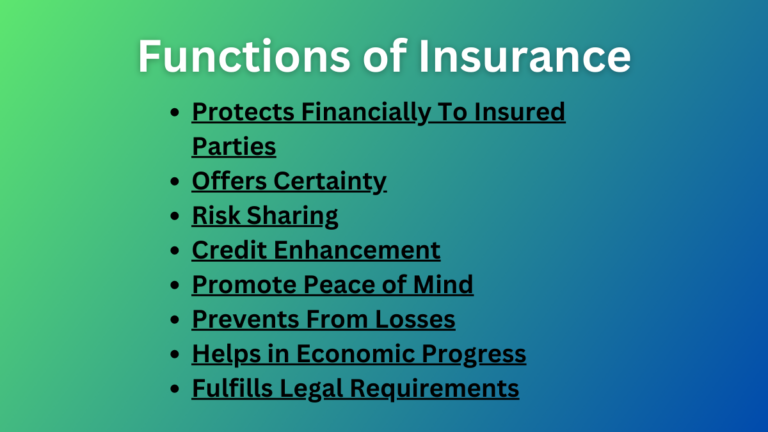The 7 Principles of Insurance Contract
Principles of Insurance
Insurance is a legal contract between the insurer (insurance company) and the insured (policyholder i.e. individual or a business).
Understanding the principles of insurance and how these principles work can be beneficial for you in deciding whether or not you need the insurance contract or not. Further, these principles let you decide whether or not you are capable of entering into valid insurance contracts.
The following seven are the main principles of insurance contracts, let’s explain them. To make the insurance contract valid, both parties insurer and the insured have to follow these principles.
Insurable Interest
To have a valid insurance contract, you must have a stake or interest in the thing being insured. This means that you benefit from its safety and would suffer a loss if it were damaged.
Without this rule, anyone could get something insured and then intentionally destroy it to get money from the insurance company. This would cause chaos. But with the rule, you can only insure things that you have a stake in.
For example, Mr. Chela can get an insurance policy (in the absence of this principle) for the house of Mr. Guru and also claim the indemnity of loss of the house from the insurance company by destroying the house of Mr. Guru.
Such activities create social chaos. However, the insurable interest principle of insurance restricts such kinds of social evil. In the above instance, Mr. Chela can get insurance for his house because he has an insurable interest in his house only.
As such, you can only insure your own house, not someone else’s.
Read More: The 8 Major Functions of Insurance Policy
Utmost Good Faith
For an insurance contract to be valid, both the insured and the insurer must act in good faith and be truthful about the thing being insured.
This means they must provide accurate and honest information about the subject of insurance. The insurer should also reveal the terms and conditions of the insurance contract to the insured.
This is important because the insurer uses the true information provided by the insured to estimate the risk and determine the premium. Similarly, the insured needs true information about the terms and conditions of the contract to make an informed decision about the insurance.
Without good faith and truthful information, the insurance contract may not be valid or may result in a dispute between the parties.
The main motive of the utmost good faith principle of insurance is to avoid cheating and benefit. Both the parties have to follow this principle. If one party does not follow this principle then the other party makes the insurance contract void.
Contract of Indemnity
Insurance is an agreement to pay a certain amount of money if something bad happens. This is called indemnity, which means compensating for financial loss or providing security against unexpected loss. Indemnity is one of the essential principles of the insurance contract.
Insurance is only meant to compensate for losses, not to make a profit. This means the amount paid to the insured can never be more than the actual loss. The loss must be measured in terms of money.
Read More: 6 Basic Marketing Concepts with Examples
The indemnity principle ensures that the insurance contract is not used to make a profit. To follow this principle, there must be an actual loss, the loss should be covered by the insurance, the insurer must pay the loss, and the payment must be equal to the actual loss.
The principle of indemnity does not apply to the life insurance policy. The loss of life of a person can not be calculated in terms of money nor can money compensate for the loss of life. This principle is strictly applicable in the insurance of properties and assets.
Principle of Subrogation
The principle of indemnity in insurance allows for the doctrine of subrogation, which means that the insurer who indemnifies the insured has the right to recover any possible benefit that the insured may have from a third party.
Essentially, when the insurer pays for the loss suffered by the insured, the insurer has the right to recover any damaged property or waste that the insured may have.
For instance, if your bus is insured but gets into an accident, you can recover the loss from the insurance company. However, you will need to transfer the property rights to the insurance company after you have been indemnified.
Read More: The 5 Levels of Market Segmentation
In other words, the principle of subrogation involves transferring ownership rights to the insurer once the insured has been indemnified for their actual loss and any available property value.
Proximate Cause
The word “Proximate Cause” is taken from the Latin word “Cause Proxima” which means main or nearest cause.
The proximate cause principle comes into operation when an event is occurred due to more than one cause. This principle is based on the concept that the compensation will be paid only if the cause of the event is insured.
According to this principle, if the loss occurs for two or more reasons, it becomes necessary to identify the most neared immediate cause.
The nearest cause is known as the proximate cause and other reasons are known as the remote cause.
Principle of Contribution
This is the second last principle in our list of 7 principles of insurance. The principle of contribution is the part of the indemnity.
The principle of contribution ensures that an insured person cannot profit by taking out multiple insurance policies on the same property.
Read More: The 5 Levels of Maslow’s Hierarchy of Needs
If a person obtains insurance policies from more than one insurance company with the intention of earning a profit by destroying the insured property, this principle limits their ability to do so.
The insured can only recover the actual loss from one insurance company or proportionally from all insurance companies based on the premium paid. By doing so, this principle prevents the insured from profiting from insurance by causing artificial loss.
Mitigation of Loss
The last principle in our list of 7 principles of insurance contracts is the mitigation of loss. This means minimizing the loss with the best effort on the occurrence of an event.
This principle prescribes that on the occurrence of an event, it is the insured’s responsibility to take necessary steps to reduce loss of subject matter and act as if he were uninsured.
Though he is bound to do his best for the insurer it does not mean that he should do so at his own risk of life. Therefore, if reasonable effort and precaution have been taken to save the property from loss, the insurer is under obligation to honor the contract.
The mitigation of loss principle emphasizes that reasonable efforts must be made by the insured to minimize the loss of the subject matter of the insurance contract.
Hence, these seven are the main principles of the insurance policy. Understanding these principles would be helpful in realizing the importance of insurance and choosing the right insurance company.
Read Next: Types of Marketing: A List of 63 Marketing Types
Sajan Kushmi is a content writer with more than 4 years of experience. He holds BIM Degree. He write on the topics related to Management, Marketing, and Entrepreneurship.


